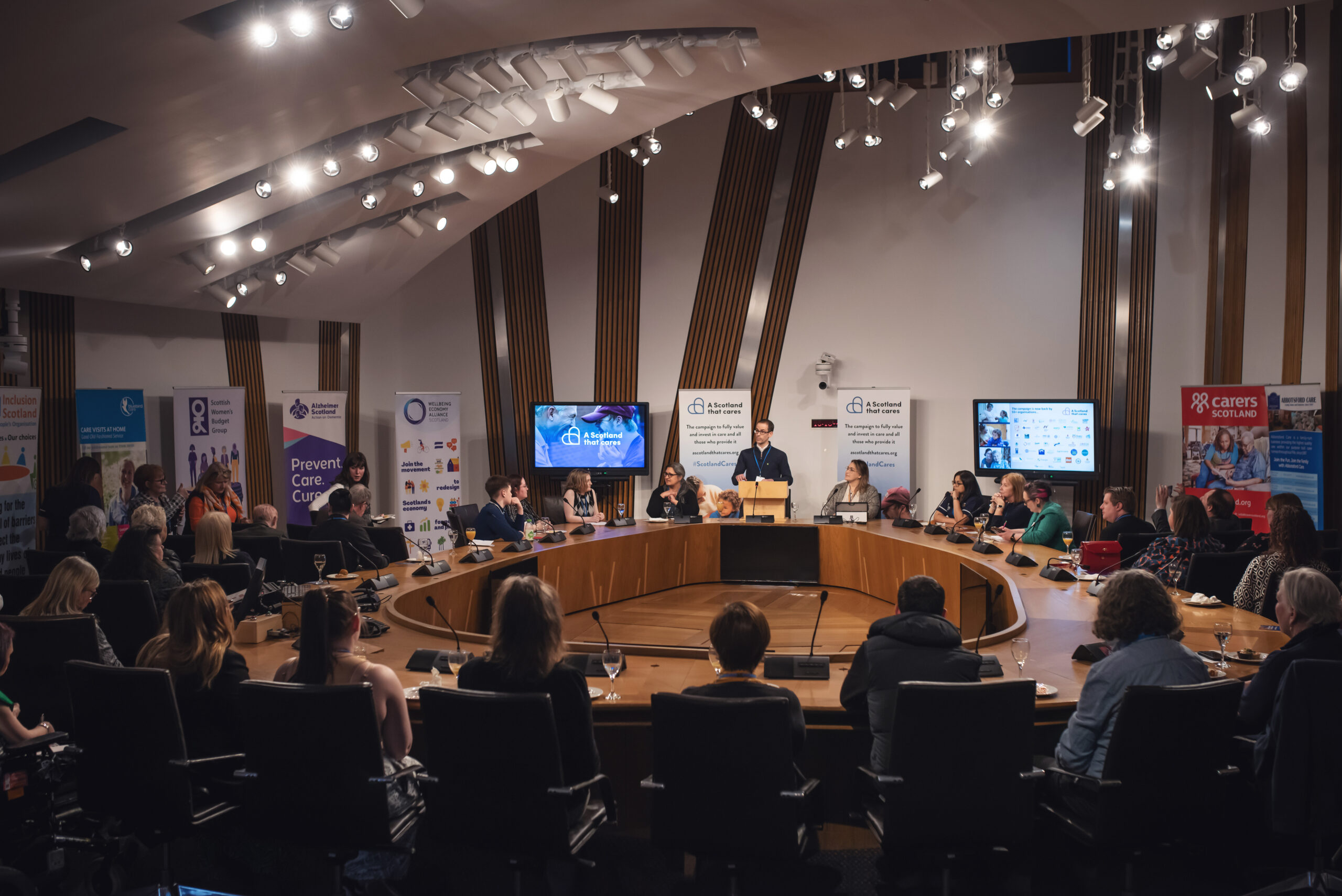By Jamie Livingstone, Head of Oxfam Scotland for A Scotland that Cares
“If you guys don’t know what we’re struggling with, how are you supposed to fix it?”
This was the simple question posed by Lindsay McCurly, a single parent of a son with autism, as she shared her experience during the A Scotland that Cares campaign reception at the Scottish Parliament on Tuesday.
Her question reinforces a stark truth: the insights, hopes and challenges of people who provide, and experience, care in Scotland are often invisible within policymaking.
In fact, Scotland’s National Outcomes – the jigsaw pieces that are meant to build a picture of the country the Scottish Government is trying to create – make them invisible, because care and carers barely feature within them. There should be little real surprise then, that progress to invest in care, and to support carers, is too slow and too shallow – leaving too many facing deep personal and financial challenges, including poverty.
Lindsay was one of four people with experience of care to speak at the parliamentary reception, which comes as the Scottish Government prepares to launch the first review of Scotland’s National Outcomes in five years.
More than 55 organisations are calling for a dedicated new National Outcome to fully value and invest in those experiencing care and all those providing it, as well as a robust set of National Indicators to track progress. We know it won’t be a silver bullet, nor a substitute for immediate action to better value and invest in care, but – over time – we believe it’ll set Scotland on a path towards transformative change. Read the blueprint created by the academics at the University of the West of Scotland.
At the heart of the parliamentary event were the experiences of four people with direct experience of care.
Diane McKechnie from Aberdeen has been an unpaid carer for the last 12 years for her husband, now diagnosed with early onset Alzheimer’s, having had to give up working as a paid care worker.
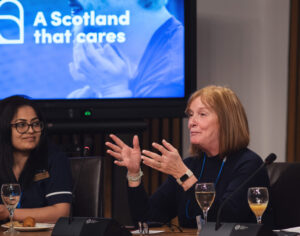
“I don’t feel valued at all. I do by my family: they’ve been a great support. But it really annoys me when professionals say to me ‘you’re saving social care thousands of pounds by keeping your husband at home’. It’s so patronising. What are they doing with the thousands of pounds that are being saved? We don’t see it.”
Citing the shortage of day centre support, Diane added: “I don’t even think my husband is valued.”
Tanzeela Majid, who became a social care worker in 2021, said: “I wish there would be more support, appreciation and recognition for social care workers.
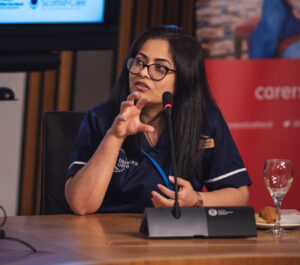
“When I came to Scotland from Kashmir, I helped my mother who was diagnosed with cancer and I looked after her for the last five years until the end of her life, while looking after my two kids.
“When I spoke to different carers, even paid carers, I learned there is a lack of lots of support here in Scotland as well. That’s why I became a part-time carer once my kids started high school. I wanted to be part of the solution – that gives me satisfaction. I just try my level best to help people.”
Max Green has been a young carer since she was five, looking after her dad and her brother, both of whom have health conditions, and now her mum, and is a member of the Scottish Youth Parliament for Carers Trust Scotland.
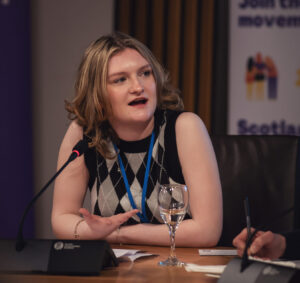 “So many young carers feel so isolated. Young carers need to have visibility, they need to be heard. To be seen. And to get the chance to say ‘this is going on’ – and get listened to and something happens.
“So many young carers feel so isolated. Young carers need to have visibility, they need to be heard. To be seen. And to get the chance to say ‘this is going on’ – and get listened to and something happens.
Max called for the removal of restrictions preventing carers from studying full-time and receiving Carer’s Allowance, and added: “Young carers only get a couple of hundred pounds per year when your 16, 17 and 18 – so you don’t have any financial freedom, and you can’t really work.
Lindsay McCurly, the single parent from Glasgow, said: “People forget you’re a person as well. You had hopes, you had dreams.
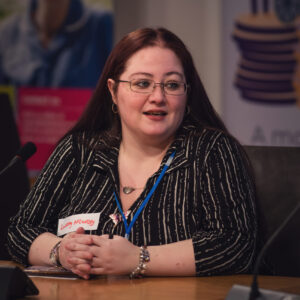 “I had intended to be a teacher because teachers change lives. It can make me feel quite sad to think of the children that I couldn’t help, because I had to stay at home and be a carer.
“I had intended to be a teacher because teachers change lives. It can make me feel quite sad to think of the children that I couldn’t help, because I had to stay at home and be a carer.
“I feel valued but only through familial connections and through pride in the young man my son is becoming, but by greater society, no. There’s no support, or help – you’re expected to know everything yourself.”
The event was hosted by Karen Adam MSP, the SNP representative for Banffshire and Buchan Coast, who spoke about her experiences caring for a family member and as a mum of six children.
“As a carer, I wanted to be counted, along with my cared for person, and I wanted our full experience to be counted.
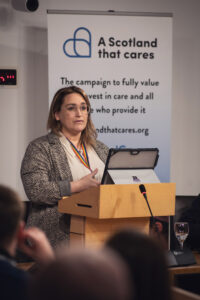 “Being a carer can mean having little to no sleep. Fighting day in and day out for help. It’s being an advocate. It’s being a nurse. It’s being a taxi slash ambulance driver. It’s being an interpreter. A cook. A cleaner. A chief bottle washer. It’s a day shift, but it’s also a night shift. And you’re also a student because you have to learn really quickly.
“Being a carer can mean having little to no sleep. Fighting day in and day out for help. It’s being an advocate. It’s being a nurse. It’s being a taxi slash ambulance driver. It’s being an interpreter. A cook. A cleaner. A chief bottle washer. It’s a day shift, but it’s also a night shift. And you’re also a student because you have to learn really quickly.
“And for some of us, it’s watching the people we care for be in pain; that takes a mental and emotional toll. It’s giving up often on any kind of whatever a normal life is. That needs to be counted.”
Karen said she felt she was ‘banging my head on a brick wall’ and that better valuing carers was a huge part of why she became a politician, adding: “We have to have care acknowledged as being central to our country’s health and wellbeing economy, because it is central to a functioning society.”
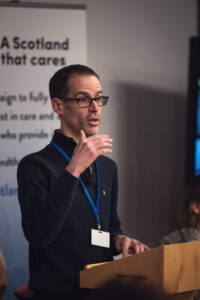 During the event, I shared why the campaign matters so much to me personally. For the last 5 years, I’ve supported my sister, Lynne, after she was diagnosed with incurable secondary breast cancer; this support was ad hoc, and at nothing like the intensity experienced by so many others.
During the event, I shared why the campaign matters so much to me personally. For the last 5 years, I’ve supported my sister, Lynne, after she was diagnosed with incurable secondary breast cancer; this support was ad hoc, and at nothing like the intensity experienced by so many others.
But it gave me an insight into the importance of good care, the human impact when that simply isn’t available, and the financial, physical, emotional and mental wellbeing for those who step in to fill the gaps. Caring is incredibly hard, and it takes a very special set of skills, talent and resilience to care for people well; it’s also inseparable from the kindness, and the love, that goes with it.
Before her death, my sister used our email action to contact the leaders of Scotland’s five political parties, and made a direct appeal for them to: “Please make this a National priority to help us truly care for each other.”
Satwat Rehman, from One Parent Families Scotland, noted that: “Every single one of us have an experience of being cared for, or of caring for somebody else – and, if you haven’t, at some point in your life, it probably will happen. But it also strikes at the heart of the type of country we want to live in: one that does care for people, one in which empathy and that invisible network of support are recognised.
“For single parents, childcare and care are really significant issues, because single parents have got sole responsibility of trying to be the breadwinner and the caregiver – there’s always a greater reliance on childcare and social care. Many single parents also work in the care sectors, and perhaps care for another family member, as well as their children, or for a child who has an additional need or a disability.
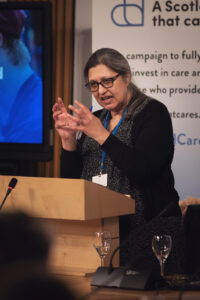 “For us, the anti-poverty element of the campaign is a really important one – because one in three children in single parent families in Scotland live in poverty.
“For us, the anti-poverty element of the campaign is a really important one – because one in three children in single parent families in Scotland live in poverty.
“We believe that bringing up and caring for children is a key element of the caring economy. Most single parents are women, and the pandemic showed – in Scotland and around the world – that the roles traditionally performed by women – like healthcare, and care work, both paid and unpaid – are the essential work that keep our society functioning.
“For too long people who care for others, whether they paid or unpaid, have been undervalued and under rewarded.”
Closing the event, Karen Hedge, Deputy Chief Executive of Scottish Care, spoke of the consequences of 15-minute care at home visits. She described the scene as one care provider arrived at a woman’s home: “They walked into this lady’s home and she was standing in the hall with her arms above her head and a pile of clothes on the floor.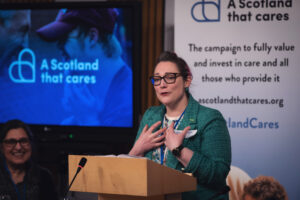
“The carer asked what she was doing, and she said, ‘well it’s a 15 minute visit, you don’t have time to properly look after me to get changed’. So, she was used to someone coming in, wheeching her clothes off, and wheeching her clothes back on, and then leaving them there in the hall – that’s not what the people of Scotland deserve”.
Karen pointed to the 3.8% pay uplift for social care workers in Scotland as evidence of ‘un-fair work, and un-fair terms and conditions’ for social care staff in Scotland, adding: “I’ve had phone calls from frontline care staff telling me they’re standing in foodbanks. I’ve had phone calls from my members saying that staff can’t come to work because they can’t afford to put the fuel in their car to get there.
“You’ve probably all heard of the saying that ‘what gets measured, gets done’. Scotland is rich in policy and legislation for social care, but it never gets done – does it? We have this huge implementation gap. It’s because for too long social care has been the Cinderella service. For too long we’ve look at it through the eyes of the NHS and through the eyes of the gendered dynamic of society.”
Read more about A Scotland that Cares and add your support
Photos: Alasdair Watson/Oxfam
